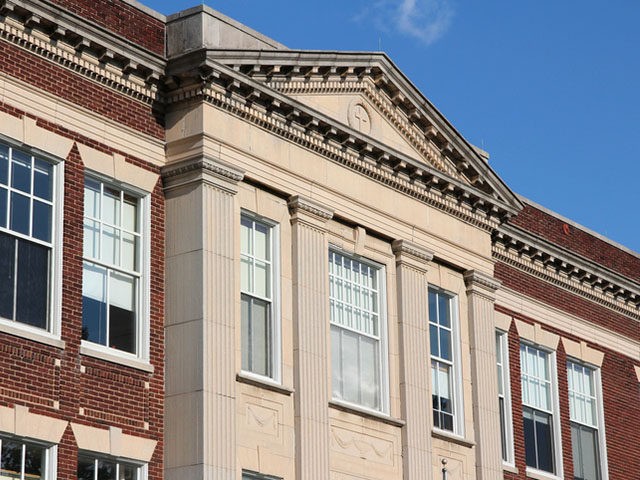The lead attorney who achieved a victory at the Supreme Court in Tuesday’s ruling protecting religious liberty and school choice said many of the latter’s opponents are hiding behind anti-Catholic amendments, backed by the Ku Klux Klan (KKK) a century ago, in order to sustain their education monopoly.
In an interview on SiriusXM’s Breitbart News Tonight with host Rebecca Mansour, Dick Komer, a senior attorney at the Institute for Justice who represented single mother Kendra Espinoza in Espinoza v. Montana Department of Revenue, said opponents of school choice used an “erroneous reading of the Establishment Clause as prohibiting the state providing any form of aid to religious institutions,” including religious schools.
LISTEN:
Komer said opponents of school choice, such as teachers’ unions, are still supporting the anti-Catholic Blaine amendments in state constitutions that have prevented aid to parents who choose religious schools for their children.
“If they looked at this dispassionately,” he said, they would see these provisions “are a product of religious bigotry.”
“Normally, they would oppose bigotry in all of its forms, but not religious bigotry,” he stressed. “It’s a way for them to protect the education monopoly, because school choice threatens that monopoly.”
“Then, the education monopoly, the teachers’ unions, etc., are hiding behind a law that was initiated by the KKK decades and decades ago … to prevent attending Catholic schooling,” Mansour summarized. “They’re hiding behind this old law, buried in a bunch of state amendments, to stop education choice today.”
“There is a definite, certain amount of just very callous and calculated use of these provisions, despite their sordid history, because it serves their interests,” Komer agreed.
The attorney said that, from the time of the founding of the nation, all schools were “religious schools.”
“The idea that the founding fathers were somehow interested only in funding secular schools is nonsense,” he said, adding that all public schools in America were once generically Protestant schools.
“When the Catholics started arriving in 1840, the Protestant establishment looked at the public schools as a way of ‘Protestantizing’ the Catholic kids,” he explained. “The Catholic Church and the Catholic parents weren’t having anything of it, and that’s why they created basically a parallel Catholic parochial school system.”
Later on, in the 1960s, Komer continued, the Supreme Court removed religion entirely from public schools, ending prayer and Bible reading in public school classrooms.
Catholic demands that public funding should be shared between religious and public schools were rejected, he said, but the issue was ultimately taken out of the hands of the legislature and placed in the state constitutions in the Blaine amendments that say public funds shall not be provided to aid religious schools.
Komer explained in the 1920s, the KKK — which was not only anti-black but also anti-Catholic and anti-Jewish — was a primary backer of legislation in Oregon that would require all children to only attend public schools. The U.S. Supreme Court ruled, however, that children are not simply wards of the state and that parents have the right to guide their children’s education.
In Espinoza, the Supreme Court ruled that states may provide tax credits to those donating to scholarship funds that include religious schools.
The majority ruled in support of a Montana tax-credit scholarship program, in which donors of funds receive tax credits for their contributions to private scholarship organizations that provide some funds toward religious school tuition.
Kendra Espinoza sought a parochial education for her daughters when her local public school proved detrimental.
The 2015 legislation by Montana lawmakers gave taxpayers a tax credit for contributions up to $150 to a student scholarship organization that Espinoza could access to help pay for her daughters’ tuition.
Montana’s Department of Revenue, however, banned tax-credit scholarships from faith-based schools, claiming those schools were not a “qualified education provider.” Subsequently, the Montana Supreme Court struck down the tax-credit scholarship program, blocking Espinoza from receiving aid.
Komer said the Court’s ruling does not require states to have a school choice program, but, for states that do, they must include religious options when secular private schools are also included.
Brian Burch, president of Catholic Vote, a national faith-based advocacy organization, said the Court’s decision in Espinoza is “a long overdue victory for American families and a defeat for anti-Catholic bigotry.”
“With this ruling, the Court has reined in state ‘Blaine amendments,’ which originated in shameful 19th century anti-Catholic bigotry, and have allowed governments to discriminate against Catholic institutions for 145 years,” he continued, noting that low-income, minority families “will especially benefit from today’s ruling as they increasingly seek alternatives to failing public schools.”
Breitbart News Tonight broadcasts live on SiriusXM Patriot channel 125 weeknights from 9:00 p.m. to midnight Eastern or 6:00 p.m. to 9:00 p.m. Pacific.

COMMENTS
Please let us know if you're having issues with commenting.